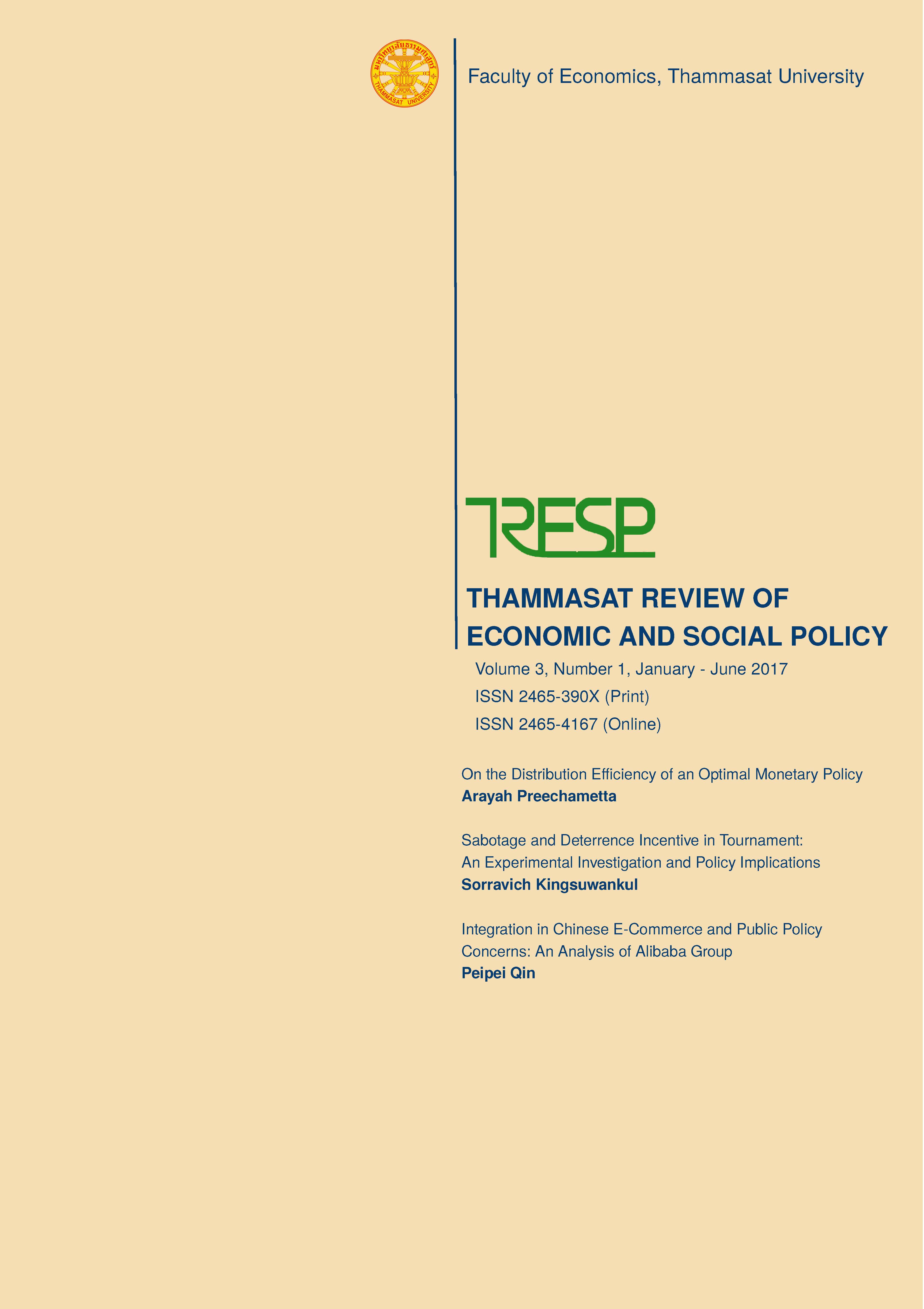Sabotage and Deterrence Incentive in Tournament: An Experimental Investigation and Policy Implications
DOI:
https://doi.org/10.14456/tresp.2017.2Keywords:
Sabotage, Rank-order tournament, Deterrence incentive, ExperimentAbstract
This research analyzes the impact of deterrence incentive on sabotage behavior in rank-order tournament using experimental method. Laboratory findings confirm Becker’s deterrence hypothesis in a tournament setting. Implementing punishment suppresses sabotage behavior. In addition, increasing probability of inspection is more effective than increasing the magnitude of penalty despite equivalence of expected punishment. Furthermore, analysis of the data reveals existence of cognitive biases influencing sabotage behavior. Findings also suggest that perceived legitimacy of the enforced rule and regulations is important. This study supports existing theoretical frameworks pertaining to tournament and economics of crime, and also provides policy implications for contest designers.
References
Becker, G. S. (1968). Crime and Punishment: An Economic Approach. Journal of Political Economy, 76(2), 169- 217. doi: 10.1086/259394
Charness, G., & Gneezy, U. (2012). Strong evidence for gender differences in risk taking. Journal of Economic Behavior & Organization, 83(1), 50-58.
Chen, K. P. (2003). Sabotage in promotion tournaments. Journal of Law, Economics, and Organization, 19(1), 119-140.
Chowdhury, S., & Gürtler, O. (2015). Sabotage in contests: a survey. Public Choice, 164(1-2), 135-155. doi: 10.1007/s11127-015-0264-9
Curry, P. A., & Mongrain, S. (2009). Deterrence in rankorder tournaments. Review of Law & Economics, 5(1), 723-740.
Dechenaux, E., Kovenock, D., & Sheremeta, R. (2015). A survey of experimental research on contests, all-pay auctions and tournaments. Experimental Economics, 18(4), 609-669. doi: 10.1007/s10683-014-9421-0
Fischbacher, U. (2007). z-Tree: Zurich toolbox for readymade economic experiments. Experimental Economics, 10(2), 171-178.
Gill, D., & Prowse, V. L. (2011). A novel computerized real effort task based on sliders. Available at SSRN 1732324.
Gilpatric, S. M. (2011). Cheating in contests. Economic Inquiry, 49(4), 1042-1053.
Gürtler, O., Münster, J., & Nieken, P. (2013). Information policy in tournaments with sabotage. The Scandinavian Journal of Economics, 115(3), 932-966.
Harbring, C., & Irlenbusch, B. (2005). Incentives in Tournaments with Endogenous Prize Selection. Journal of Institutional and Theoretical Economics JITE, 161(4), 636-663. doi: 10.1628/093245605775075951
Harbring, C., & Irlenbusch, B. (2008). How many winners are good to have?: On tournaments with sabotage. Journal of Economic Behavior & Organization, 65(3– 4), 682-702. doi: http://dx.doi.org/10.1016/j.jebo.2006.03.004
Harbring, C., & Irlenbusch, B. (2011). Sabotage in Tournaments: Evidence from a Laboratory Experiment. Management Science, 57(4), 611-627. doi:10.1287/mnsc.1100.1296
Harbring, C., Irlenbusch, B., Kräkel, M., & Selten, R. (2007). Sabotage in Corporate Contests – An Experimental Analysis. International Journal of the Economics of Business, 14(3), 367-392. doi: 10.1080/13571510701597445
Henrich, J. (2006). Cooperation, punishment, and the evolution of human institutions. Science(Washington), 311(5769), 60-61.
Holt, C. A., & Laury, S. K. (2002). Risk aversion and incentive effects. American Economic Review, 92(5), 1644-1655.
Lazear, E. P. (1989). Pay Equality and Industrial Politics. Journal of Political Economy, 97(3), 561-580. doi: 10.1086/261616
Lazear, E. P., & Rosen, S. (1981). Rank-Order Tournaments as Optimum Labor Contracts. Journal of Political Economy, 89(5), 841-864. doi: 10.1086/261010
Mather, M., & Lighthall, N. R. (2012). Risk and reward are processed differently in decisions made under stress. Current directions in psychological science, 21(1), 36- 41.
Nagin, D. S., & Pogarsky, G. (2003). An experimental investigation of deterrence: Cheating, self‐serving bias, and impulsivity. Criminology, 41(1), 167-194.
Salop, S. C., & Scheffman, D. T. (1983). Raising Rivals' Costs. The American Economic Review, 73(2), 267- 271.
Schildberg-Hörisch, H., & Strassmair, C. (2012). An experimental test of the deterrence hypothesis. Journal of Law, Economics, and Organization, 28(3), 447-459.
Sundheim, D. (2014, August 07). Do Women Take as Many Risks as Men? Retrieved February 23, 2017, from https://hbr.org/2013/02/do-women-take-asmany-risks-as
Tversky, A., & Kahneman, D. (1986). Rational Choice and the Framing of Decisions. The Journal of Business, 59(4), S251-S278.



